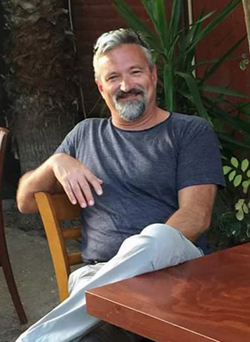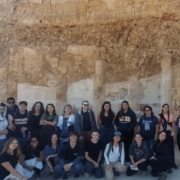MGSDII Classroom Collaboration Professor Shares Thoughts on Israel Archeology Boycott with San Diego Jewish World
Despite Boycott, UCSD Prof. Plans Exchange Program with Tel Aviv University
By Donald H. Harrison
Donald H. Harrison

Geoffrey Braswell
SAN DIEGO – UCSD Anthropology Professor Geoffrey Braswell says the decision last month by the American Anthropology Association (AAA) to boycott Israeli universities for their alleged support of “Israeli apartheid” will cause some American professors and students who engage in research with Israelis to feel stigmatized and ultimately may diminish, rather than elevate, the academic field of anthropology.
The AAA resolution was adopted July 24 by a vote of 2,016 to 835. Although, according to the AAA’s website, the boycott “is limited to AAA—as an association—refraining from formal collaborations with Israeli academic institutions” and “pertains only to Israeli academic institutions, and not to individual scholars and students affiliated with these institutions,” Braswell, a tenured professor specializing in Mesoamerican archaeology, argued in an interview on Sunday that the boycott can hamper the free exchange of scholarly ideas, discourage new students from entering the field of anthropology, and by its exclusive focus on Israel – rather than on all countries with controversial policies—clearly is antisemitic.
“If one wants to take an ideological stand on all the horrible things in this world, there are many that we could,” he said. “We could boycott China for two massive genocides, one in Tibet and an even worse one with the Uyghurs in East Turkestan. We could boycott Russian universities that have contributed to the technologies of the military in the invasion of Ukraine. We could boycott Iranian universities for their complicity in discrimination against women. We could boycott institutions in countries that have laws that execute LGBTQ people (Iran, Nigeria, Saudi Arabia, Somalia, Sudan, and Yemen). But we don’t. What this tells me is that the Triple-A (AAA) is not interested in helping the Palestinian people, and they should be. Instead, they are more interested in going after a single nation and people. If this were a broad boycott, I would say that this is stupid and we shouldn’t have any boycott, but it is narrow and it is always against Israel and the Jews.”
Braswell had withdrawn as a member of the AAA in 2016, the last time the issue was the subject of the association’s national referendum. That year, the boycott was rejected by a narrow margin, 2,423 opposing the boycott to 2,384 in favor. “For me,” recalled Braswell, “it was the last straw of an academic institution that doesn’t really help my field of archaeology,” which along with cultural anthropology, is a subdivision of the overall anthropology discipline. The AAA, he added, has been “transforming itself from an academic and scholarly organization into sort of a political action committee.”
Even as last month’s balloting was occurring, Braswell was winning approval from UCSD’s Faculty Senate and the university administration for an exchange program between UCSD and Tel Aviv University (TAU) at both the graduate and undergraduate levels. He said that seven Israeli students will come to San Diego to learn about archaeological theory and seven UCSD students will travel to Israel to learn about archaeology in Israel and the Levant.
The exchange program is part of a broader collaboration between UCSD and TAU “where students will be able to move back and forth and take credits freely at both institutions and have them count,” Braswell said.
Since 2016, Israeli professors from various universities have taught at UC San Diego and San Diego State University as well as at other local universities under the Murray Galinson San Diego-Israel Initiative. In Spring 2024, Theatre-Dance and Sociology Prof Dan Geva from Beit Berl Academic College and Anthropology-Sociology Prof. Dan Rabinowitz from Tel Aviv University are scheduled to teach at UCSD. Five other Israeli professors will teach at SDSU during the 2023-2023 academic year.
The stance of the University of California is a direct repudiation of the anti-Israel boycott, Braswell said. He noted that the chancellors of all the campuses of the University of California “signed after the last mishigas [Yiddish for craziness] an agreement stating categorically that they are against any kind of academic boycott.”
Notwithstanding the University of California’s support for programs with Israel, Braswell said he wonders “what the reaction will be among anthropologists in my department? Will they be scared that there will be repercussions? Will the AAA boycott us? Will they not allow UCSD Anthropology to participate as a group in their meetings – individually, fine, but as a group will they not allow us to advertise open positions, which is really the primary purpose of AAA? It remains to be seen if the implementation will have enforcements against violators of this boycott. At present, I don’t think that is the way it is going, but who knows?”
While as a tenured professor his job is secure, Braswell said, “I am very frightened for our grad students and recent grads who work in Israel. I am very frightened for people who want to study anything that has to do with Israel, whether archaeology or cultural anthropology. This boycott is going to make it hard for them to get jobs, hard for them to publish except in very specialized journals. It is going to make every word that they write scrutinized politically at a level that others won’t be. I think ultimately it will force a lot of people out of the field.”
Braswell described AAA’s boycott resolution as being “filled with vitriol; the typical ‘Israel is an apartheid state’ and all thee things over and over again. It blames academic institutions for being complicit in oppression.”
One clause in the resolution states “Israeli academic institutions are complicit in the Israeli state’s regime of oppression against Palestinians … including by providing research and development of military and surveillance technologies used against Palestinians.”
Braswell said that anthropology professors in Israel, as in the United States, typically occupy the left side of the political spectrum and support the establishment of an independent Palestinian state, as he does. He said for Israeli anthropologists and many liberal Israeli professors in other academic fields, the boycott amounts to “stabbing colleagues in the back.”
I asked Braswell to describe what Israeli archaeologists and American archaeologists can teach each other.
“Any intellectual field, including archaeology, needs really broad opinions, broad ideas, and broad background, to question what we do and to bring new perspectives,” he responded.
“I think the biggest contributions that we can make to Israelis coming here is theory,” he added. “Archaeological theory in America is embedded in traditional anthropology. So, we study systems of human interaction. We don’t simply try to determine historical facts – A, B, C, and then D and E happened. That has been a problem in the past of biblical archaeology which has mostly been based on trying to prove or disprove, depending on your perspective, the literal truth of biblical events. While an anthropological study might well ask ‘how was this society structured? What kind of political system did they have?’”
Until about the 1980s, Braswell said, Israeli archaeology focused on “What does the Bible say and how can we dig it up?” For Maya archaeologists like himself, there is much to be learned from Israeli archaeologists, Braswell said. “We didn’t have texts that we could read until the late 1980s. Now we have rich hieroglyphic background that we are reading but we haven’t developed the same sorts of tools for integrating text and archaeology that biblical archaeologist had forever. They’ve always had the Bible; it is going to be in your back pocket. It is something to look at and think about. In the cases of Mayanists (who study the ancient civilizations of southern Mexico, Guatemala and Belize), we are still learning texts and forms of data.”
Also, “a lot of high-tech techniques are really strong in Israel. A former student here who is Israeli does all kinds of things with archaeomagnetism to date things. He recently published a paper on the destruction of the City of David which he can date to the Persian period because of his new, finely developed, techniques. So, our students can go there and learn that.”
Braswell said he believes the AAA’s anti-Israel resolution results from an ill-informed view that pictures the Israeli-Palestinian dispute in racial terms. The resolution’s backers “depict it as a racial conflict between Brown people and White people. Israeli Jews run the whole gamut of color and race. I think the largest group of Israeli Jews are Moroccans. They are not very different in many ways from Arabs,” Braswell said.
“I think if I weren’t a Jew, I would not be aware that Israel is a fantastically diverse nation,” he commented. “Even the Arabs are not all the same, of course. There is a huge difference between Druze and Palestinian Muslims, a huge difference between Bedouin and the rest, and there are other differences too. Americans like to view conflicts in black and white, and we Americans like to root for the underdog and so we tend to view things from our own racial terms.”
He said the field of anthropology “has long rejected race as anything other than a social construct. Any anthropologist you talk to will say it has no real biological meaning. And yet this boycott is an attempt by anthropologists to view a very complicated problem solely in terms of race. I think that goes strongly against the kind of intellectual nuances and deep, broad, and contextual understandings that anthropology has always stood for.”
*
Donald H. Harrison is editor emeritus of San Diego Jewish World. He may be contacted via donald.harrison@sdjewishworld.com



